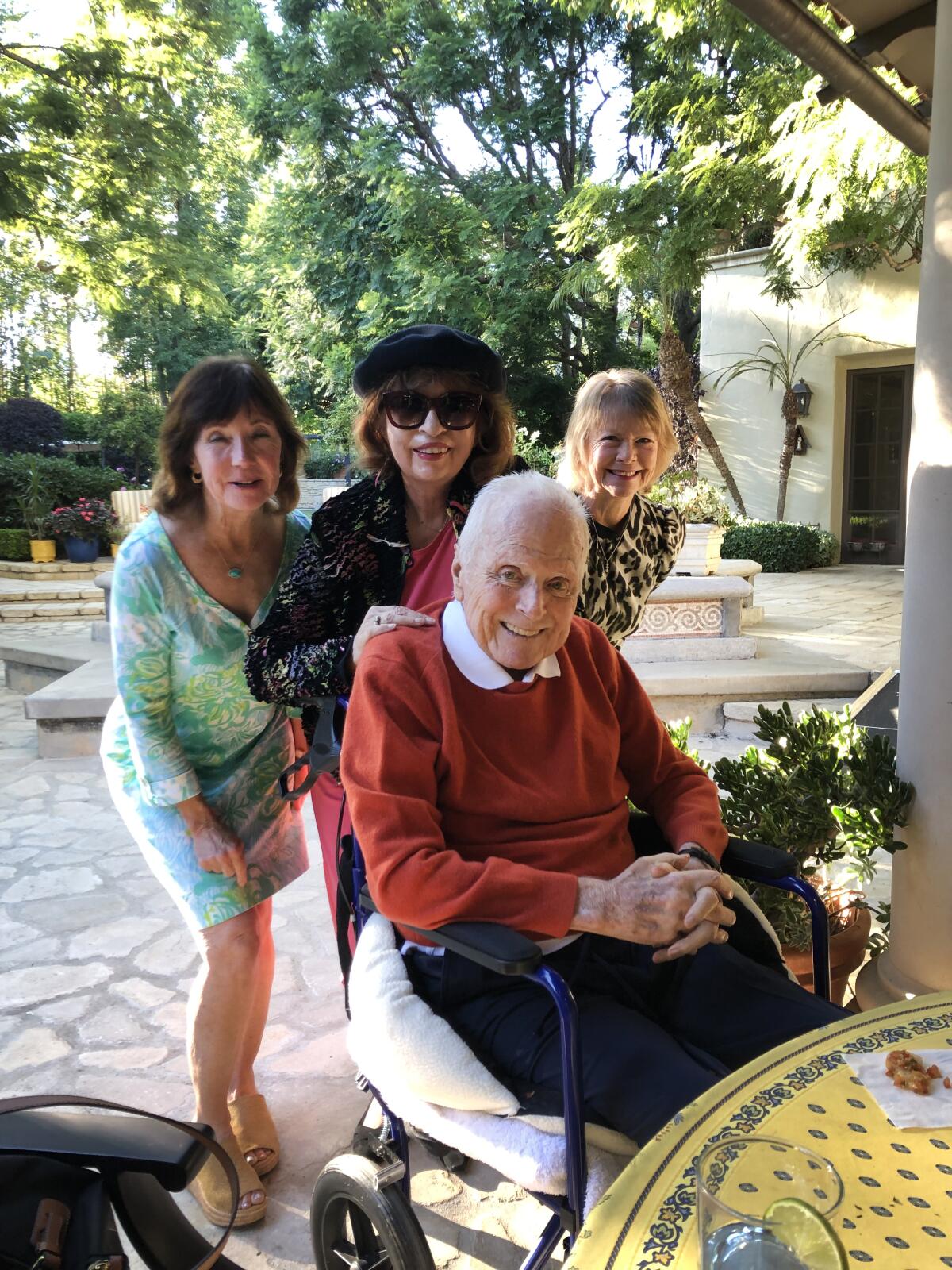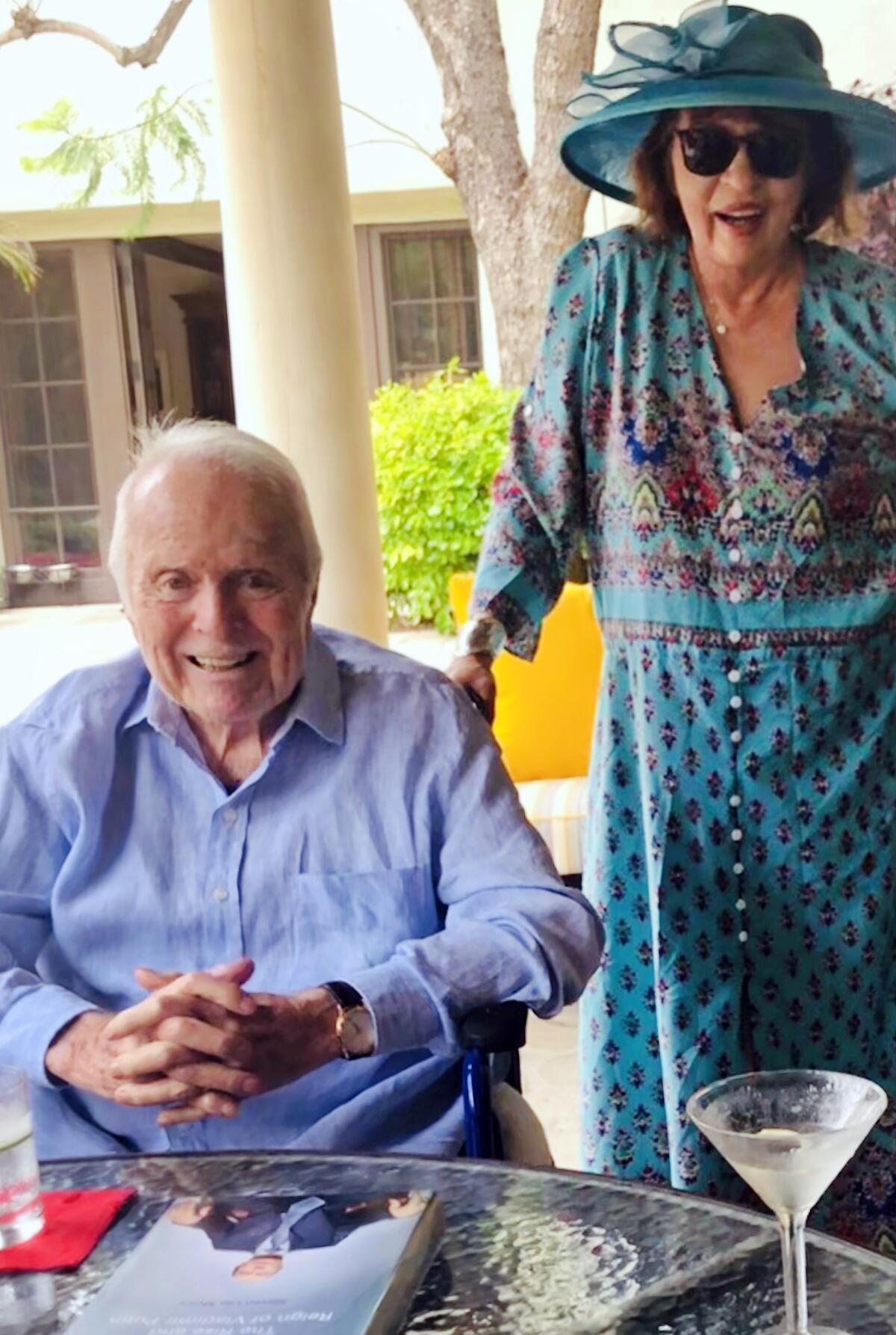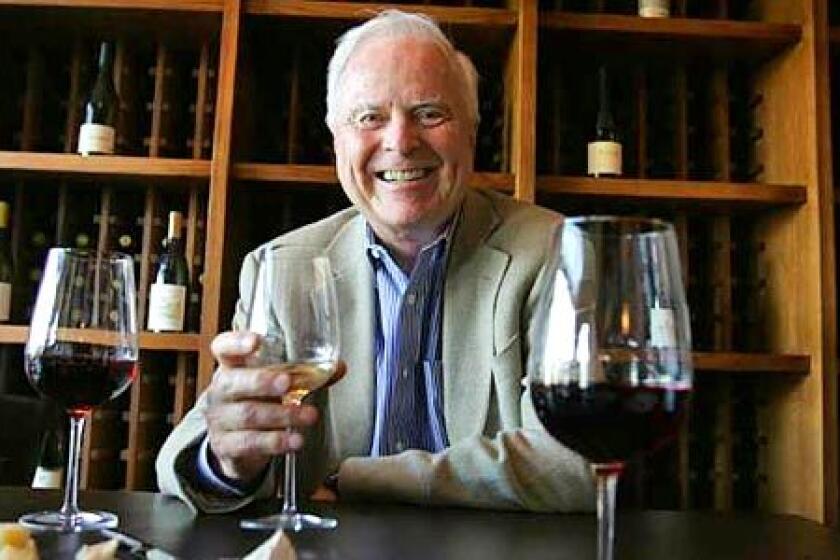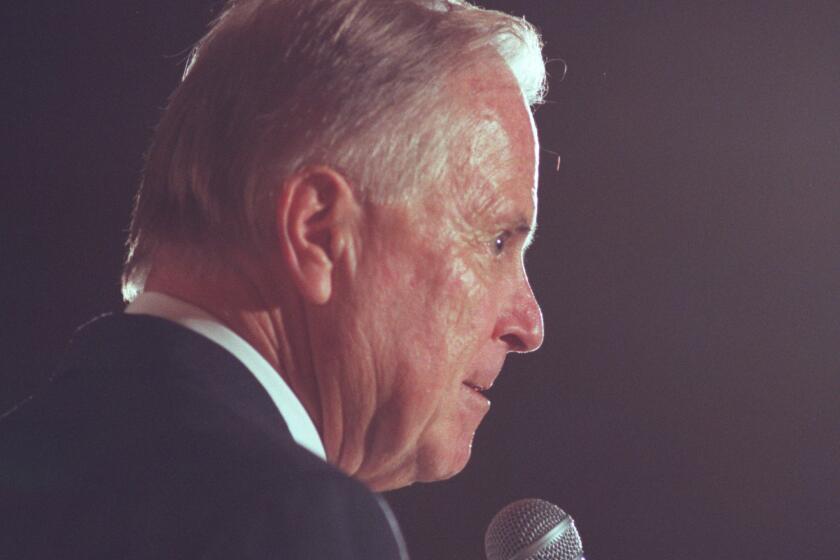At Richard J. Riordan’s book club, nearly 30 years of Proust, wine and friends

- Share via
When it came to being a politician in the sense we knew one — a cautiously crafted, assembly-line product of focus groups and consultants — Dick Riordan was not that guy.
No political consultant would have thought that a plurality of voters would go for a pro-choice Republican whose favorite movies were “Harold and Maude” and “Witness for the Prosecution,” a man who loved reading Evelyn Waugh and Marcel Proust — who loved reading, period — and who could play Broadway standards on the piano like a nightclub virtuoso.
Yet Riordan got elected and reelected mayor of Los Angeles, from the city’s post-riot PTSD and earthquake and into the millennium year of 2001.
He was also, political differences or no, my friend, affable and sometimes persuadable, and we stayed friends for more than 20 years, until his death Wednesday at 92. Through all the head-butting over politics and policies, each of us knew the other wanted the best for the country and, especially, this city. He was one of that imperiled species, a noblesse oblige Republican.
You can’t say he was guileless. No man who amasses millions can do that without being canny and far-sighted and possessing a strategic ruthlessness that he deployed on the chessboard and at the poker table as well as in the boardroom.
Riordan shepherded L.A.’s rebound from the 1992 riots, expanded its police force and led its recovery from the Northridge earthquake.
Before Donald Trump’s exultingly vicious personality corrupted the cheerier idea of “authenticity” in politics, Dick as a politician remained an amateur, maybe even a bit of a naif, sometimes impatient with the horizontal mechanics of democracy versus the vertical authority of the corporate world.
But the public came to know and like his earnestness, his goofiness. He was the guy who’d clap a wacky hat on his head for the cameras. He bristled at news coverage he didn’t like — and I certainly got many earfuls from him about that — but he could laugh at himself. It came naturally, as it does to all authentic leaders (not you, Donald Trump). He was an original “as is” guy. Unless someone put him to rights, he might show up for a speech with his shirttail out, or wearing his lunch on his tie.
Dick was a surprising athlete — skier, bicyclist and ice skater. When the renowned L.A. photographer Gary Leonard snapped a picture of Dick falling on his ass on the holiday ice rink at Pershing Square, Dick bought copies. He blurted out jokes — some good, some groaners, a few outright tone-deaf and offensive, born of the age and station that created him. He beta-tested some on his daughter, Trish Riordan Torrey.
“Do you think I can tell that joke?” he’d ask. And she’d say, “Dad, if you’re asking me, you can’t.” Of course, he didn’t always ask.
He was, as The Times wrote after he was elected in 1993, a study in contradictions. We in the Riordan book group saw all of this up close.
Richard J. Riordan, who died this week, liked to fight with journalists, including this one. But he also signaled his respect.
Our group began not long after I visited Riordan’s astounding home library — 40,000 books, most of them bulk-bought when Immaculate Heart College closed in the 1980s and augmented by the hundreds by Dick’s book-buying fervor.
It’s a dream library, with upper and lower tiers and a cine-dramatic circular staircase to get there. There were books in the basement, the bathrooms, everywhere. On his nightstand the day I asked to see it: “The White Nile” by Alan Moorehead, a book about educational policies, another on great speeches of history and an amusing bonne bouche by G.K. Chesterton. He was that kind of reader.
Our original members were Dick, his law colleague and friend Bruce Merritt, the fabled writer Ray Bradbury and me.
We soon added others, and in time, the core group filled 10 or a dozen or 14 chairs at his dining room table every month. Some members eventually moved away, like Alan and Arlene Alda — the actor and his writer wife — and scholar James Q. Wilson and his wife, Roberta, as new ones arrived.
My friends Michael and Pat York, the actor and the photographer, joined us. The state historian Kevin Starr and his wife, Sheila; my L.A. Times colleague Martha Groves; fellow columnist James Flanigan and his wife, Patricia. KNBC TV standouts Kelly Lange and Fritz Coleman — the latter a recent member whose comedy performances Dick enjoyed. Dick’s nephew Mike Riordan and wife Nancy. A number of prominent L.A. philanthropists.
Merritt, a former federal prosecutor, now retired from the law, and his wife, Valerie, are still regulars. Dick’s wonderful wife, Elizabeth, sat on his right. I was the sergeant at arms, at Dick’s left, and, with stern taps on a wineglass, enforced the “one conversation” rule, lest the discussion fracture.
Our book group was together for so long that differences of opinion could happen. Books do that, are supposed to do that: a napkin thrown down on the table as a chair was shoved back, a prelude to walking out. But we always, always, bore respect and affection for one another.
At that first meeting in January 1995, we four had read “Einstein’s Dreams,” and we were puzzled by bits of it. Other book groups might keep on puzzling, but Dick, the mayor of L.A., got the author, Alan Lightman, on the speakerphone to grill him.
L.A. had many other multimillionaires but only one mayor. Even as ex-mayor, it tickled Dick that he could wheedle an author into joining us. Several of us thought that was a lousy idea. It inhibited conversation about a bad book. That happened once, when we all disliked the book, and there we sat, with the famous author expecting accolades that didn’t come.
Former Mayor Richard Riordan, who died Wednesday, pulled Los Angeles out of the mire of the 1992 riots and the shambles of the Northridge earthquake.
Yet once, Sidney Poitier joined us to talk about his autobiography and was nothing less than a delight. We read “Shopgirl” with Steve Martin there, and after most people had drifted on home, Mr. M and I wound up on the Riordan kitchen floor, playing with the dogs.
We read big books, serious books: “Black Lamb and Grey Falcon,” about the history of the Balkans. We revisited Dickens and Fitzgerald, Philip Roth, Graham Greene — another Riordan favorite — and, yes, Proust. When we read a book about Eisenhower as supreme commander in World War II, Dick unearthed a bottle of 1945 port.
The day in 1989 that one of our members, Peter Allen, met Dick, the two began their friendship with a chess game — and the friendship and chess never stopped. Dick, Peter marveled, was “fully alive.” Dick took ski and bicycling holidays at Peter’s place in Sun Valley, Idaho, where his sleep-apnea snoring, thundering from the living-room sofa, once woke up Peter’s mother.
From his deep wine collection, Dick gave Peter a bottle of 1976 Chateau Lafite Rothschild.
“Peter,” he said, “I am too cheap to drink this expensive wine, and I am too proud to sell it, so I would rather give it to you!” Alas, it turned out to be undrinkable, but the kindness, and the memory of it, lasted Peter to this day.
Writer Donna Foote is another of our members. A few years back, her friend’s father was dying with one wish: Dick had been his best friend in high school, and he wanted to talk again to the man he’d lost touch with. Dick “dropped everything, called the dying man and stayed on the phone reminiscing as if not a day had passed since they had last spoken,” Foote recalled. “His friend died shortly after that, a happy man.”
Merritt, from our original foursome, bonded with Dick over their shared love of Greene and Waugh. Merritt was surprised to find such a bookish fellow in a corporate lawyer’s suit — and such a “natural schmoozer” too.
“Long before he got involved in politics, I met him for lunch one day at the Polo Lounge,” Merritt said. “He had reserved a table on the patio at the far end of the restaurant. It took us almost 20 minutes to walk from the entrance of the restaurant to the patio, because he knew somebody at almost every table we passed and had to stop to talk with them.”
His birthday parties were sprawling, genial affairs, with kids, dogs, food, movies. His nephew Mike remembers Dick’s favorite rejoinders, stitched on caps Dick gave to his guests: “What’s your point?” and “I couldn’t agree with you more.” I remember another favorite: “I was young! I needed the money!”
He didn’t suffer fools gladly, Mike remembered last week, but “he was interested in pretty much everyone’s story.”
We teased Dick about the fact that he, a devoted capitalist, shared a birthday with international celebrations of labor movements and a Communist holiday — and he might answer, “What’s your point?”

Some of the obituaries noted that one of Dick’s daughters, Carol, died at 18 of an eating disorder, and his son, Billy, died at 21 in a scuba accident. But there was an earlier generation of tragedy.
Yes, he became rich, and yes, he was born at the cusp of the Depression into a comfortably prosperous family, the youngest of eight kids.
But money, as he learned over and over, could not brick him off from tragedy. One of his sisters died at age 5 from a brain tumor. Another sister burned to death in a fire. A brother died in a mudslide on L.A.’s Westside in 1969.
When he said “I’m a rescuer,” he meant people, and institutions. Ten years ago, terribly sick in the intensive care unit with serious flu, he told his daughter Trish that the work that had made him happiest was his philanthropy.
His rescue dogs were his delight, and they were with him when he died. Much more than earlier mayors, he paid attention to the city’s animal services and appointed his daughter Kathy to the commission responsible for their care, where she served admirably, I think, holding to account practices that had never been questioned before.
Kathy is even more tenderhearted about animals than her dad. Once, when Dick’s third wife, the late children’s activist Nancy Daly Riordan, bought a crocodile handbag, Kathy looked stricken.
“Kathy, Kathy,” her dad soothed her. “That crocodile had a cat in its mouth.”
His campaign slogan in that first election was “Tough enough to turn L.A. around.” Knowing him as I came to, I might have rewritten it to “different enough,” but hey, I’m no politician, either.
More to Read
Sign up for Essential California
The most important California stories and recommendations in your inbox every morning.
You may occasionally receive promotional content from the Los Angeles Times.













